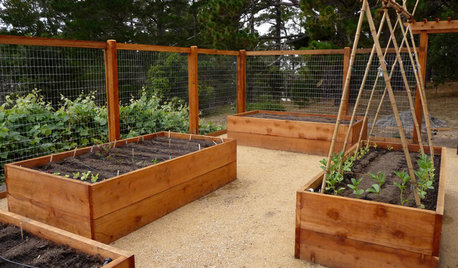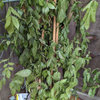a few questions about changing my irrigation system
winstonsaxonsdad
13 years ago
Related Stories

GARDENING GUIDESHow to Install a Drip Irrigation System
Save time and water with a drip watering system in your vegetable garden — a little patience now will pay off later
Full Story
REMODELING GUIDESConsidering a Fixer-Upper? 15 Questions to Ask First
Learn about the hidden costs and treasures of older homes to avoid budget surprises and accidentally tossing valuable features
Full Story
GREEN BUILDINGWhat's LEED All About, Anyway?
If you're looking for a sustainable, energy-efficient home, look into LEED certification. Learn about the program and its rating system here
Full Story
ORGANIZING4 Questions to Help You Organize Your Favorite Photos
Organize your keeper photos with a system that's just right for you, whether it's in the cloud or you can hold it in your hand
Full Story
WORKING WITH PROS10 Questions to Ask Potential Contractors
Ensure the right fit by interviewing general contractors about topics that go beyond the basics
Full Story
ORGANIZINGDo It for the Kids! A Few Routines Help a Home Run More Smoothly
Not a Naturally Organized person? These tips can help you tackle the onslaught of papers, meals, laundry — and even help you find your keys
Full Story
MOST POPULARA Few Words on the Power of Simplicity
An architect considers a pared-down approach to modern home design
Full Story
DREAM SPACESJust a Few Things for the Dream-Home Wish List
A sunken hot tub, dedicated game room, tree house, hidden wine cellar and more. Which of these home luxuries would you like best?
Full Story
COFFEE WITH AN ARCHITECTA Few Things I Would Like to Ask Frank Lloyd Wright
It could take a lifetime to understand Frank Lloyd Wright's work — less if we had answers to a few simple questions
Full Story
LIGHTINGWhat to Know About Switching to LED Lightbulbs
If you’ve been thinking about changing over to LEDs but aren't sure how to do it and which to buy, this story is for you
Full StoryMore Discussions








cloud9landscapes
winstonsaxonsdadOriginal Author
Related Professionals
Salem Landscape Architects & Landscape Designers · Summit Landscape Architects & Landscape Designers · Chesapeake Ranch Estates Landscape Contractors · El Segundo Landscape Contractors · Fair Oaks Landscape Contractors · Harrisburg Landscape Contractors · Lexington Landscape Contractors · North Canton Landscape Contractors · Overland Park Landscape Contractors · San Antonio Landscape Contractors · South Hackensack Landscape Contractors · Palos Hills Landscape Contractors · East Norriton Landscape Contractors · Bel Air Solar Energy Systems · Glen Ellyn Solar Energy Systemscloud9landscapes
winstonsaxonsdadOriginal Author
cloud9landscapes